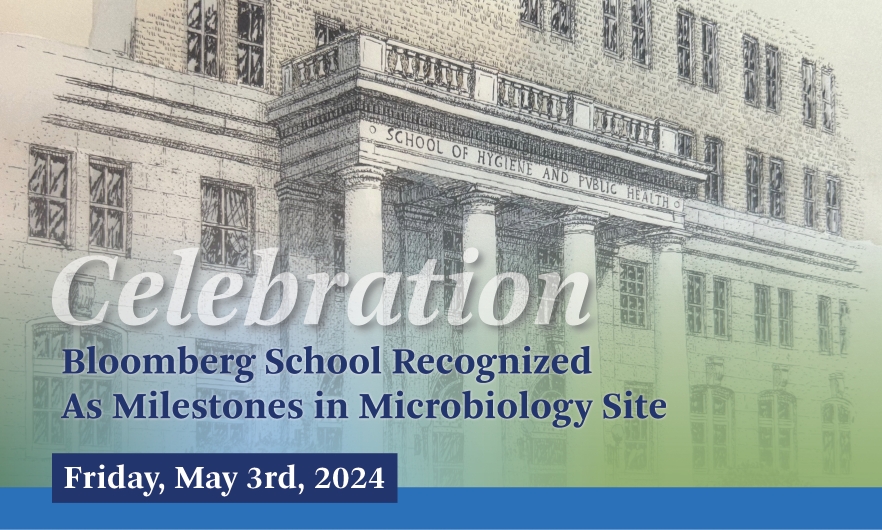The Johns Hopkins Bloomberg School of Public Health will be formally recognized by the American Society for Microbiology (ASM) as a historic site on Friday, May 3, 2024.
1:30 - 2:00 p.m. MMI Alumni & Guests Arrive/Registration
Enter at Monument St. entrance
2:00 - 3:30 p.m. Celebration of 100+ Years of Virology and Immunology
Sommer Hall E2014/E3018
Welcome - Gary Ketner, Virologist, MMI Professor, Master of Ceremonies
Diane Griffin, Professor and former Department Chair, University Distinguished Professor
Keynote Address: Bernard Roizman, ScD '56 "Honoring 100 Years of Virology"
Tribute to Virologist Keerti Shah, former MMI Department Chair, Remarks by Pavitt Gravitt PhD '02, Deputy Director, Center for Global Health, National Cancer Institute, NIH
Tribute to Immunologist Noel Rose and former MMI Department Chair, Remarks by Daniela Čiháková, Associate Director, Clinical Immunology Laboratory, Johns Hopkins School of Medicine, Joint Appointment MMI
Highlights of Current Science by MMI Faculty
3:30 - 4:00 p.m. Tours of MMI Labs and MMI Library
4:00 - 5:00 p.m. Schoolwide Ceremony: Bloomberg School Recognized as Milestones in Microbiology Historic Site
Sommer Hall E2014/E3018
Gary Ketner, Master of Ceremonies
Ellen J. MacKenzie, PhD ’79, ScM ’75
Dean, Bloomberg School of Public Health; Bloomberg Distinguished Professor
The Founding of the Johns Hopkins School of Public Health and Hygiene
Arturo Casadevall
Alfred and Jill Sommer Professor and Chair, W. Harry Feinstone Department of Molecular Microbiology and Immunology; Bloomberg Distinguished Professor
David Celentano
Professor and Dr. Charles Armstrong Chair, Department of Epidemiology
Celebrated Historic Events at the Johns Hopkins Bloomberg School of Public Health
First Departments of Virology and Immunology, First Virology Course
Joseph Margolick, Professor, MMI; Director, Immunology Core
The Legacy of David Bodian, Isabel Morgan, and Howard Howe
J. Marie Hardwick, David Bodian Professor, Vice Chair of Research, MMI
Fred Bang – “Horseshoe crab blood coagulation & bacterial endotoxin”
Jack Levin, Professor of Medicine, University of California San Francisco
Discovery of RSV by Chanock, Roizman, Myers, and Finberg
Diane Griffin
Unveiling and Presentation of the ASM Plaque
Virginia Miller, President, American Society for Microbiology
Professor, Genetics and Professor, Microbiology and Immunology, University of North Carolina at Chapel Hill
Colleen Puterbaugh, Archivist, Center for the History of Microbiology Archives
5:00 - 6:00 p.m. Reception
Schoolwide Celebration in the First Floor Gallery
Bloomberg School Historic Firsts
Since the founding of the School 1916, faculty members and their teams in what are now the Department of Molecular Microbiology and Immunology (MMI) and the Department of Epidemiology, have contributed multiple historical “firsts,” pivotal scientifics discoveries, and advancements in microbiology.
1916 - First independent, multidisciplinary school of public health
1916 - First Department of Immunology
1922 - First course on virology (then called filterable viruses)
1925 - First Department of Virology (Filterable Viruses)
1941-1947 - First delineation of paralytic poliovirus pathogenesis by David Bodian, Howard Howe, and Isabel Morgan
1944-1949 - First identification of the three pathogenic poliovirus serotypes that were incorporated into effective vaccines by Isabel Morgan, David Bodian, and Howard Howe
1953 - First demonstration that Gram-negative bacteria induced rapid coagulation of the hemolymph from horseshoe crabs, by Frederik B. Bang. This observation is the basis for the near-universally used, life-saving Limulus amebocyte lysate assay for endotoxin.
1957 - First isolation of human respiratory syncytial virus (RSV) by Robert Chanock, Bernard Roizman, Ruth Myers, and Laurence Finberg
What does the designation Milestones in Microbiology mean? Read a brief explanation here.

